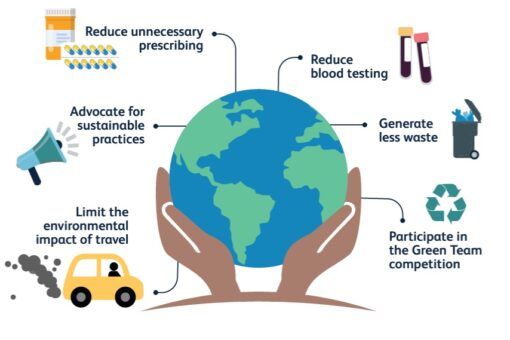
Background
Healthcare professionals are under immense pressure with significant demand across the NHS. These pressures can make prioritising sustainability challenging, but there is a role for physicians to play with the support of their leaders and systems.
In 2023, the Royal College of Physicians (RCP) adopted healthcare sustainability and climate change as one of its policy and campaigns priorities. In 2024, it published the Green Physician Toolkit to help support physicians to begin to improve the sustainability of their clinical practice – a key aim of the RCP’s focus on sustainability and climate change.
What has your organisation done?
The Green Physician Toolkit sets out evidence on the link between health and climate change to build understanding. It also suggests actions that physicians can adopt to mitigate the environmental impact of healthcare delivery and adapt to the impact of climate change – like reducing unnecessary prescribing and blood testing. The evidence and actions in the toolkit are not exhaustive, but a starting point for physicians to embed sustainability in their day-to-day practice.
The toolkit was developed through the RCP’s sustainability in healthcare and climate change advisory group which comprises the RCP academic vice president, special adviser and deputy special adviser on sustainability, physicians from different career grades, external sustainability experts and patient carer network (PCN) representatives. It draws on work developed by organisations like the World Health Organization, UK Health Security Agency, and the Centre for Sustainable Healthcare and with input from the RCP’s sustainability advisory group. The document was approved by RCP Council.
What were the challenges?
The RCP represents over 30 medical specialties, with physicians working in a range of specialties and settings all facing slightly different sustainability considerations. Therefore, the RCP toolkit on healthcare sustainability needed to be broad enough to suggest implementable actions that are applicable to most physicians. Some within the RCP membership and the wider clinical community are heavily involved in sustainability and climate change projects, while others are newer to this area.
To overcome these challenges, the advisory group agreed to focus on universal actions that all physicians could take up, ensuring that it was accessible and useful to those who were new to this space. Advisory group members and RCP Council reviewed the actions in the toolkit to determine the feasibility of applying these in each of their different settings and specialties. In addition, case studies were included in the toolkit, to show examples of where some of the actions have been implemented in practice.
What were the outcomes?
The toolkit established a set of tangible, but impactful, actions for a range of RCP members to support more sustainable clinical practice. The RCP is encouraging all clinicians to use the toolkit and provide feedback on it – where actions were more difficult to implement than expected, and the barriers to implementation, or areas of clinical practice that we might be able to focus on in future. The feedback received will help us to review and improve the toolkit to make it more useful to members. The insights on barriers will also feed into our influencing and campaigning.
The toolkit received media attention following its launch, sparking debate about the role of physicians in talking about climate change. In response, the RCP said that patient care will always come first, but that it would be ‘irresponsible to ignore the increasing impact that climate change will have on patient health’.
What are the next steps?
Supporting physicians to improve the sustainability of their clinical practice continues to be a focus for the RCP, as well as ensuring sustainability is seen as a priority in the NHS, such as through the government’s 10-year plan. The toolkit is a helpful starting point for physicians, and the RCP will continue its work in this area.
Resources and References
You can find the Green Physician Toolkit on the RCP’s website.
